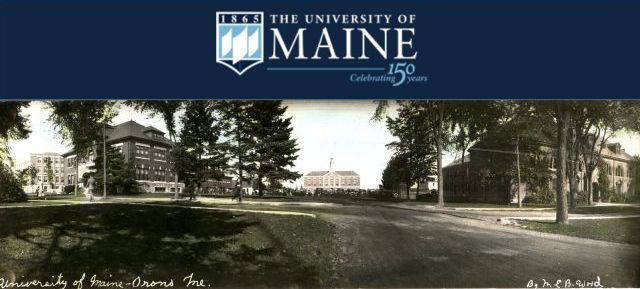
General University of Maine Publications
Document Type
Other
Editor
Dana T. Whitman, managing editor
Ralph Flynn, assistant editor
William Horner, feature editor
Publisher
University of Maine
Publication Date
11-1-1946
Publisher location
Orono, Maine
Abstract/ Summary
Libraries and archives collect materials from different cultures and time periods to preserve and make available the historical record. As a result, materials such as those presented here may reflect sexist, misogynistic, abusive, racist, or discriminatory attitudes or actions that some may find disturbing, harmful, or difficult to view.
Both a humor and literary magazine, The Pine Needle was a University of Maine periodical that began publication in the fall of 1946, the first post-World War II semester that saw GIs returning to campus.
Of the 32 student staff members listed in the publication's November 1946 mast head, the Managing Editor Dana T. Whitman and six additional students were returning Veterans, including Clair Chamberlain, Bill Gibson, Don Caswell, Dick Haskell, Don Devoe, and Don Crossland.
The Needle reflected an edginess, sophistication, and rebellion not found in previous UMaine student publications which reflected a sense of homely, shared cultural experiences among students. While past student publications relied on veiled euphemisms for drunkenness and dating on campus, The Needle crashed out of the gates with an emphasis on sex and sexualizing co-eds, as well as the use of drugs, tobacco, and alcohol by students returning from war.
Cover art for this issue is by Bonnie Cratty (1925-2010) of Bangor. The chalk illustration depicts a pair of disembodied lips smoking a pipe hovering above a fuller pair of disembodied lips smoking a cigarette. Tobacco smoke trails upward, spelling out the words "Pine Needle." Cratty, who also served as the "Make-up Editor" [in charge of the magazine's layout] is described by the editorial staff as "...our chief cocaine eater...," potentially a reference to Benzedrine and other amphetamines that grew in popularity during the war years as soldiers and citizens battled the physical, psychological, and social impact of the war.
Following graduation, Cratty found employment with the U.S. Displaced Persons Commission in Frankfurt, Germany. She later transferred to the office of the U.S. Land Observer for Schleswig-Holstein, Kiel, Germany, then to the U.S. Consulate, Munich, Germany and finally the U.S. Army Intelligence School, Oberammergau, Germany. Following her marriage to Major Meade Klemme of the U.S. Air Force, the couple settled in Fairfield, California.
Repository Citation
Pine Needle Publications; Jennison, Ted; Haskell, Rip; Chamberlain, Clair; Miller, Jean; and Bridges, Kay, "The Pine Needle, November 1946" (1946). General University of Maine Publications. 2453.
https://digitalcommons.library.umaine.edu/univ_publications/2453
Version
publisher's version of the published document
Rights and Access Note
This Item is protected by copyright and/or related rights. You are free to use this Item in any way that is permitted by the copyright and related rights legislation that applies to your use. In addition, no permission is required from the rights-holder(s) for educational uses. For other uses, you need to obtain permission from the rights-holder(s).


